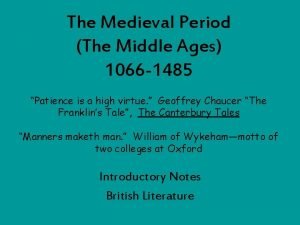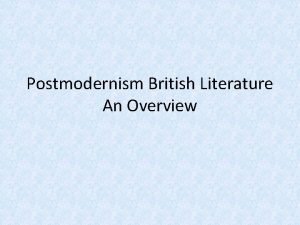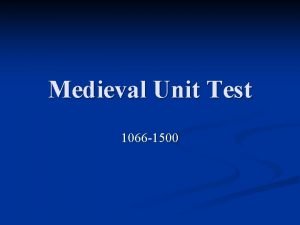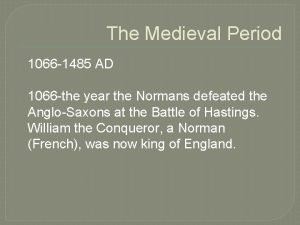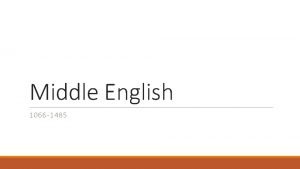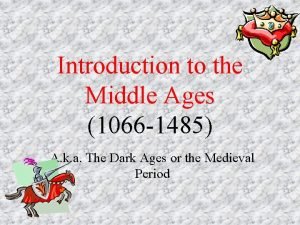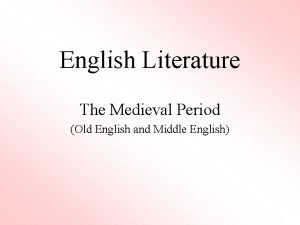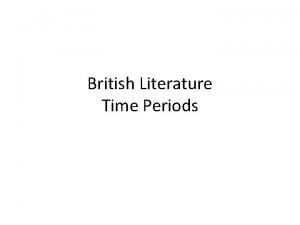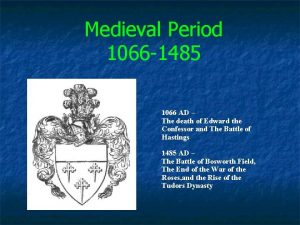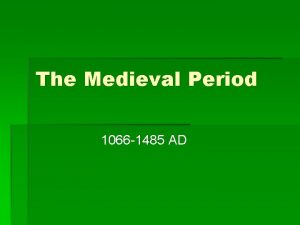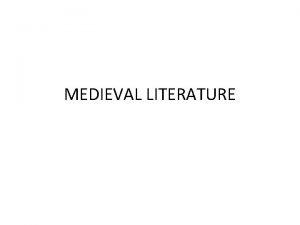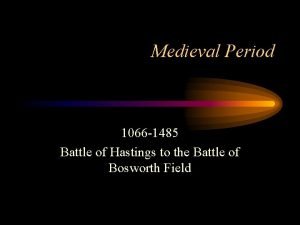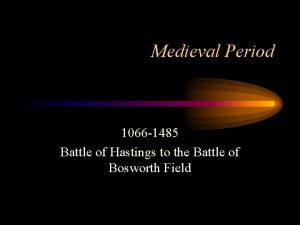Medieval Time Period and Literature 1066 1485 What







- Slides: 7

Medieval Time Period and Literature 1066 - 1485

What changed? l l l Norman Conquest (Battle of Hastings) – Harold (King of England) was defeated by William “The Conqueror” (King of Normandy) William slaughtered most of the Anglo Saxon nobility and replaced them with Normans Results: Inventory and seizure of property, martial law put into effect, strong central government created with clear lines of authority Combination of Norman administrators and lawyers adapting and overtaking Anglo-Saxon government led to new rule It was a true blend of the two groups.

Land the Feudal system Since William had wiped out the great Anglo-Saxon landowner with his invasion he had a lot of land at his disposal. l What did he do with it? Granted it to men who had faithfully fought with him and expected obedience and service in return – thus… The Feudal system. l Note in Anglo Saxon times the Kings kept the loyalty of their soldiers by sharing the spoils of war – In Medieval times land replaced spoils. l Led to disputes about land, so 20 years later, William completed an inventory of land – Domesday Book (Doomsday) – which is preserved in London currently. l


Church, Life and Law Church: Latin became language of the Church and all educated persons. Every person was responsible to the church – preserved and transmitted culture. It was Europe’s chief publisher, librarian, and teacher. Abbey’s and monasteries were main centers of learning. Economically self-sufficient – immense farms that taught and practiced handicrafts Shift from agrarian to pastoral economy. Wool produced by English sheep was the best. Population to cities to become involved in wool industry. Common people could now use money to pay their overlords instead of labor. Guilds (societies to regulate prices and standards) were formed by middle class. (unions) Cathedrals built – revolution in architecture-histories written in stone, stained glass and wood. Dress was bright and varied. William instituted written public documents for most government actions. Common Law – applies to whole country instead of specific classes. Primogeniture – first son has exclusive right to inherit his father’s titles, lands, and estates. Still the rule in England today. Magna Carta – limiting taxes levied by the kings

The Crusades and Romance l l l Western Europe gained info from the Crusades to the Near East. Christian Europe was exposed to mathematics and medicine. Commercial and intellectual horizons were broadened, knowledge and manners of refinement were brought back. Chivalry – the knightly warrior should be as devout and tenderhearted off the battlefield as he was bold and fearless on it. It was an ideal rather than an actual code of conduct. Medieval romance consisted largely of tales of chivalry to which were added a love interest and all sorts of wonders and marvels – fairy enchantments, giants, dragons, wizards and sorceresses. l Chivalric ideals of honor, courage, courtesy, and service to women. l l l Morte D’Arthur Sir Gawain and the Green Knight

Ballads, Dramas, and Geoffrey Chaucer l Ballads – songs, not written down, but recited and sung in innumerable ale houses and at thousands of firesides. Subject matter stemmed from the everyday life of the common folk. Themes included disappointed love, jealousy, revenge, sudden disaster, and deeds of adventure and daring. - Refrain – last two lines of each stanza are repeated adding emphasis Dramas began as miracle plays in the cathedrals – dramatizations of Biblical stories l Geoffrey Chaucer – First truly great figure in English literature – Poker-faced humorist. Wrote Canterbury Tales to convey his opinions of the different people in Medieval society. l
 Middle english period (1066-1500)
Middle english period (1066-1500) Postmodernism in british literature
Postmodernism in british literature The middle ages 1066 to 1485 unit test
The middle ages 1066 to 1485 unit test The middle ages 1066-1485 unit test
The middle ages 1066-1485 unit test The middle ages 1066 to 1485 unit introduction
The middle ages 1066 to 1485 unit introduction The middle ages 1066 to 1485 unit test closed book
The middle ages 1066 to 1485 unit test closed book Characteristics of medieval period in english literature
Characteristics of medieval period in english literature The old english period
The old english period
